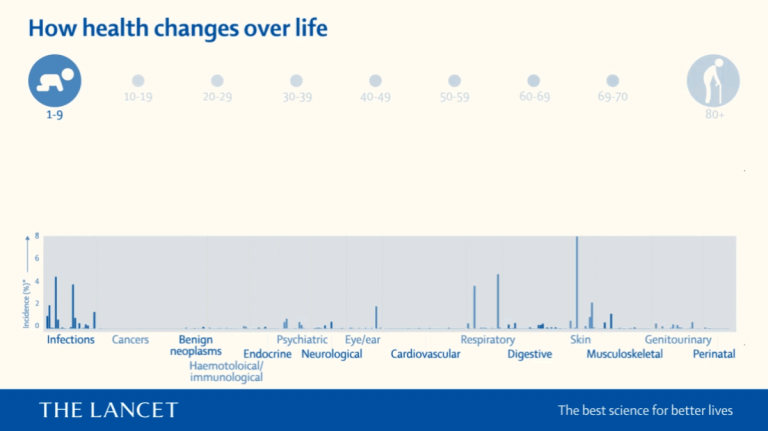New CALIBER paper published today in Lancet Digital Health
21 May 2019
A new paper featuring work by a group including IHI researchers entitled 'A chronological map of 308 physical and mental health conditions from 4 million individuals in the English National Health Service' was published today in Lancet Digital Health.

A new paper featuring work by a group of researchers co-led by Dr Valerie Kuan (a UCL Wellcome Trust Clinical Training Fellow) and Dr Spiros Denaxas (IHI) entitled 'A chronological map of 308 physical and mental health conditions from 4 million individuals in the English National Health Service' was published today in Lancet Digital Health.
As human life expectancy increases, so does the presence of chronic disease which in turn increases the need for research into the mechanisms, prevention and treatment of ageing-related diseases (ARDs). The overarching aim of this being to prolong health and disease-free life, commonly referred to as ‘healthspan’. Despite the need for this form of research becoming more urgent, no formal criteria exist to identify and classify diseases for which increasing age is a major risk factor. This paper sought to change that.
By analysing aggregated data from electronic health records (EHRs) for 3,872,451 individuals in England over the age of 20 between 1 April 2010 and 31 March 2015, using an algorithm developed to define and detect ARDs, the group of researchers were able to capture the relationship of the diseases with increasing age at the population level.
Diseases were grouped into nine clusters according to their patterns of disease onset between 20 and 85 years of age via the application of an agglomerative hierarchical clustering algorithm. 214 of 289 high-burden diseases analysed were found to have a high likelihood of being related to increasing age and were therefore identified as ARDs. The majority of these diseases were mapped to the special sense organs (eye and ear), to cardiovascular, respiratory, endocrine, digestive and neurological systems and to cancers.
By specifying a set of diseases for which ageing is a risk factor and charting the age trajectory of these diseases, this research paves the way for fundamental and translational research into the mechanisms of ageing and preventative health interventions earlier in life. Additionally, the algorithm developed for this research can be used to define ARDs which co-occur more often than chance can account for and the common drivers behind these. These co-occurring diseases are likely to share common biological mechanisms, therefore existing drugs targeting these mechanisms may be retargeted for other ARDs with similar molecular pathways. By facilitating this, this research may prove critical in the realisation of the societal goal of longer disease-free lives.
The analysis included in this paper was made possible by the availability for research of routinely collected primary and secondary care data from a single healthcare system with universal coverage. Linkage between the two main data sources, using the CALIBER research platform, required extensive expert curation and harmonisation of diagnostic codes between primary care (which uses the READ system) and hospital episodes and procedures in secondary care (that use the ICD system).
This work was the result of a collaboration between UCL IHI and the Institute of Cardiovascular Science, and the BRC HIGODS and Cardiovascular themes. It was co-funded by the BRC HIGODS as well as the Medical Research Council and the British Heart Foundation (via funding to the Farr, as was).
To read the full paper visit doi.org/10.1016/S2589-7500(19)30012-3
Dr Valerie Kuan was interviewed by Rupa Sarkar, Editor-in-Chief of The Lancet Digital Health to discuss this research. To listen to the podcast click here: https://www.thelancet.com/audio
Kuan, V., Denaxas, S., Gonzalez-Izquierdo, A., Direk, K., Bhatti, O., Husain, S., et al (2019). A chronological map of 308 physical and mental health conditions from 4 million individuals in the English National Health Service. The Lancet Digital Health, 7500(19), 1–15. https://doi.org/10.1016/S2589-7500(19)30012-3
 Close
Close

